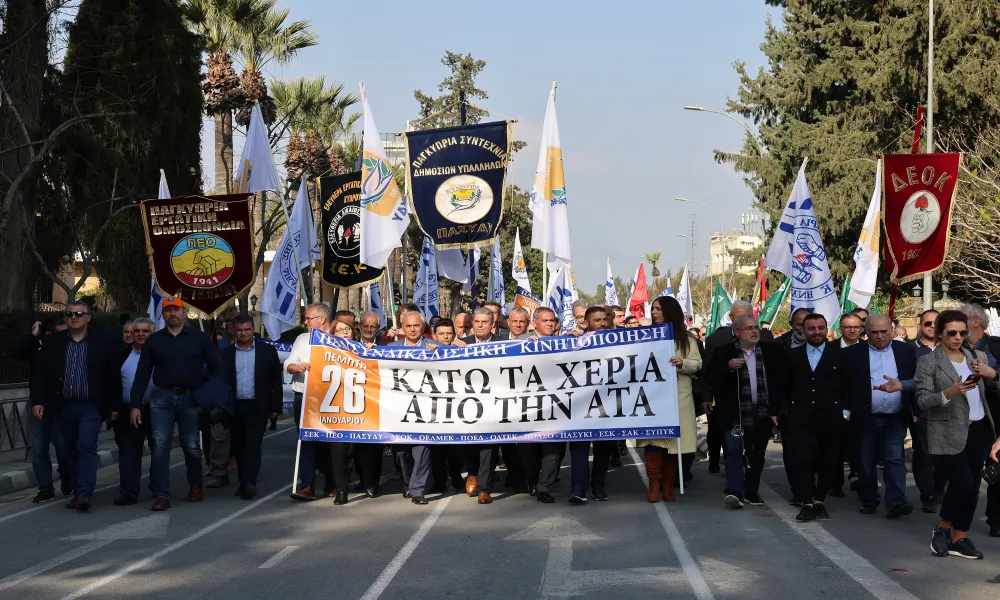September has begun with tensions on the labour front, as the failure to reach agreement on the Cost of Living Allowance (CoLA) threatens industrial peace. Trade unions have confirmed their decision to hold a three-hour work stoppage across all sectors of the economy on Thursday 11 September, demanding full restoration of CoLA. The move has prompted a new round of talks led by Labour Minister Yiannis Panayiotou in a last-ditch effort to bridge the gap, although the outcome remains uncertain, with no proposal yet able to break the deadlock.
Minister Panayiotou has not abandoned mediation efforts and has resisted declaring talks collapsed. His ministry said it will continue to work towards consensus in the days leading up to the strike, stressing that the aim remains to avoid disruption.
“The Ministry of Labour and Social Insurance remains committed to the mediation process to achieve convergence and secure an agreement on the future of CoLA, which requires the constructive contribution of the social partners,” the ministry said in a statement following Monday’s all-union conference where the strike action was decided.
“Despite the difficulties and disagreements, intensive efforts to reach an agreement must continue and strike measures must be avoided, in order to safeguard labour peace and confirm the spirit of tripartite cooperation,” it added.
According to the ministry, consultations are under way and meetings are being scheduled within the framework of social dialogue. Both sides are expected to show collective responsibility to preserve stability in the labour market.
Unions press ahead with strike action
At Monday’s conference, held at the PEO headquarters, 13 trade unions agreed to proceed with a three-hour strike between 11 a.m. and 2 p.m. on Thursday 11 September. They warned that further escalation could follow if necessary.
An earlier plan for the stoppage to take place on 10 September from 7 a.m. to 10 a.m. was abandoned after discussion, with unions deciding that the following day’s later slot was more effective.
The strike is expected to affect the entire economy, with unions representing workers across both the public and private sectors. Regional gatherings will be held during the stoppage, while the main rally will take place outside the Ministry of Finance in Nicosia at midday.
PEO Secretary-General Sotiroula Charalambous said after the meeting that “the trade union movement has once again reaffirmed the readiness of workers to fight for CoLA. What we have heard in recent months through dialogue is yet another attempt to change CoLA’s philosophy, to dismantle its purpose of restoring the purchasing power of wages, and to gradually abolish the system altogether.”
SEK Secretary-General Andreas Matsas said the unions were united in sending a clear message of solidarity to workers. “We call on employers and the government to rise to the occasion, so that the fundamental parameters underpinning collective agreements are respected and upheld,” he stressed.
Union leaders accused the government of aligning itself “absolutely” with the position of employers, which they described as “outside the agreed framework.” They said this had been confirmed at Friday’s joint meeting.
Speaking to Politis, Ms Charalambous clarified that unions were open to new meetings “but not to go in circles. As long as the framework is unclear and employers insist on demands outside CoLA’s philosophy, there will be no progress,” she said.
DEOK President Stelios Christodoulou added that a technical organising committee had been formed to ensure the strike is as successful as possible. “We want to send a clear message to employers, the government and society that CoLA is a cornerstone we will defend with all our strength,” he said.
Employers warn of damage to economy
Employer organisations KEVE and OEB strongly criticised the unions’ decision, warning of serious consequences for Cyprus’s economy.
KEVE described the move as both “futile and dangerous.” It said that at a time when businesses and society are struggling to maintain stability and build prospects for growth, “the choice of unnecessary confrontation torpedoes productivity, discourages investment and directly harms the credibility of our country.”
It added that “resorting to strikes instead of sincere dialogue is a sign of irresponsibility” and warned of “heavy consequences not only for businesses, but also for workers and households that will face additional pressure.” KEVE called the strike a form of blackmail that undermines competitiveness and sends negative signals to investors and international partners.
The Employers and Industrialists Federation (OEB) also voiced disappointment, saying the strike breaches the Industrial Relations Code. It reaffirmed its commitment to the agreements signed in 2017 and 2023 with the unions and the Labour Ministry to seek a “permanent and comprehensive settlement for a new CoLA framework.” Any such settlement, it stressed, must be freely acceptable to both sides.
